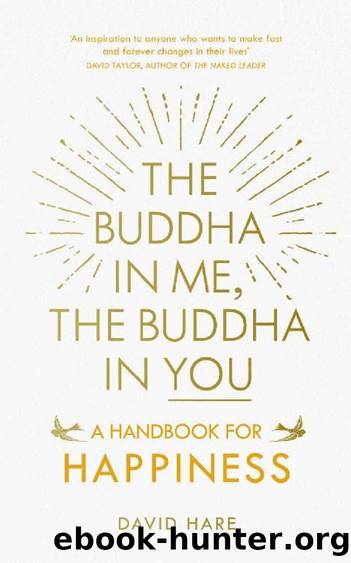The Buddha in Me, The Buddha in You: A Handbook for Happiness by David Hare

Author:David Hare [Hare, David]
Language: eng
Format: epub
ISBN: 9781473528208
Publisher: Ebury Publishing
Published: 2016-02-04T05:00:00+00:00
No Nirvana
The pre-Nichiren schools of Buddhism (the ones more commonly known in the West) had claimed that it was our desires that produced suffering and therefore if you had no desires you could no longer suffer â QED. Makes sense at first glance, doesnât it? And like all Buddhist teachings, this undoubtedly had value for a time. Until you realise that the desire to have no desires is a desire in itself ⦠And that following this route can leave you feeling numb and empty. And that to suppress your desires is to risk becoming a lardy, lumpy blob of nothing.
Of course, the dictatorial government of Nichirenâs time was quite happy for people to know their place and keep their ambitions in check, all on a âjam tomorrowâ promise that when you died there would be salvation in a âPure Landâ or nirvana (heaven) â a place whose existence Nichiren vigorously denied (see Chapter 10). Where his Buddhism is so radically different is that rather than encouraging us to selfishly follow all our desires or, at the other extreme, selflessly suppress them, or indeed veer between the two poles, he talks about transforming them, often using the analogy of turning âpoison into medicineâ.
I once knew a Nichiren Buddhist who sincerely chanted for a woman who had hurt him to suffer a terrible accident and die, so angry did he feel about what she âhad done to himâ. Because there are no moral rules in this practice, he was not advised to suppress this desire or feel ashamed of it. Because Buddhism is non-judgemental, any starting point is acceptable; practitioners trust the power of Nam-myoho-renge-kyo to drive their lives in a positive value-creating direction. His chanting slowly but surely harnessed the passion in his anger and transformed it into more positive and creative thoughts about the woman in question. He slowly began to feel respect, gratitude and even compassion towards her, realising that what she had âdone to himâ was a reflection of the sediment in his own life. Thank you, Spoon.
Download
This site does not store any files on its server. We only index and link to content provided by other sites. Please contact the content providers to delete copyright contents if any and email us, we'll remove relevant links or contents immediately.
The Way of Zen by Alan W. Watts(6600)
Ego Is the Enemy by Ryan Holiday(5413)
The Art of Happiness by The Dalai Lama(4125)
The Book of Joy by Dalai Lama(3976)
Why Buddhism is True by Robert Wright(3446)
Spark Joy by Marie Kondo(3298)
Shift into Freedom by Loch Kelly(3194)
Happiness by Matthieu Ricard(3040)
A Monk's Guide to a Clean House and Mind by Shoukei Matsumoto(2909)
The Lost Art of Good Conversation by Sakyong Mipham(2650)
The Meaning of the Library by unknow(2564)
The Unfettered Mind: Writings from a Zen Master to a Master Swordsman by Takuan Soho(2306)
The Third Eye by T. Lobsang Rampa(2257)
Anthology by T J(2206)
Red Shambhala by Andrei Znamenski(2193)
The Diamond Cutter by Geshe Michael Roach(2058)
Thoughts Without A Thinker: Psychotherapy from a Buddhist Perspective by Epstein Mark(2013)
Twilight of Idols and Anti-Christ by Friedrich Nietzsche(1892)
Advice Not Given by Mark Epstein(1878)
